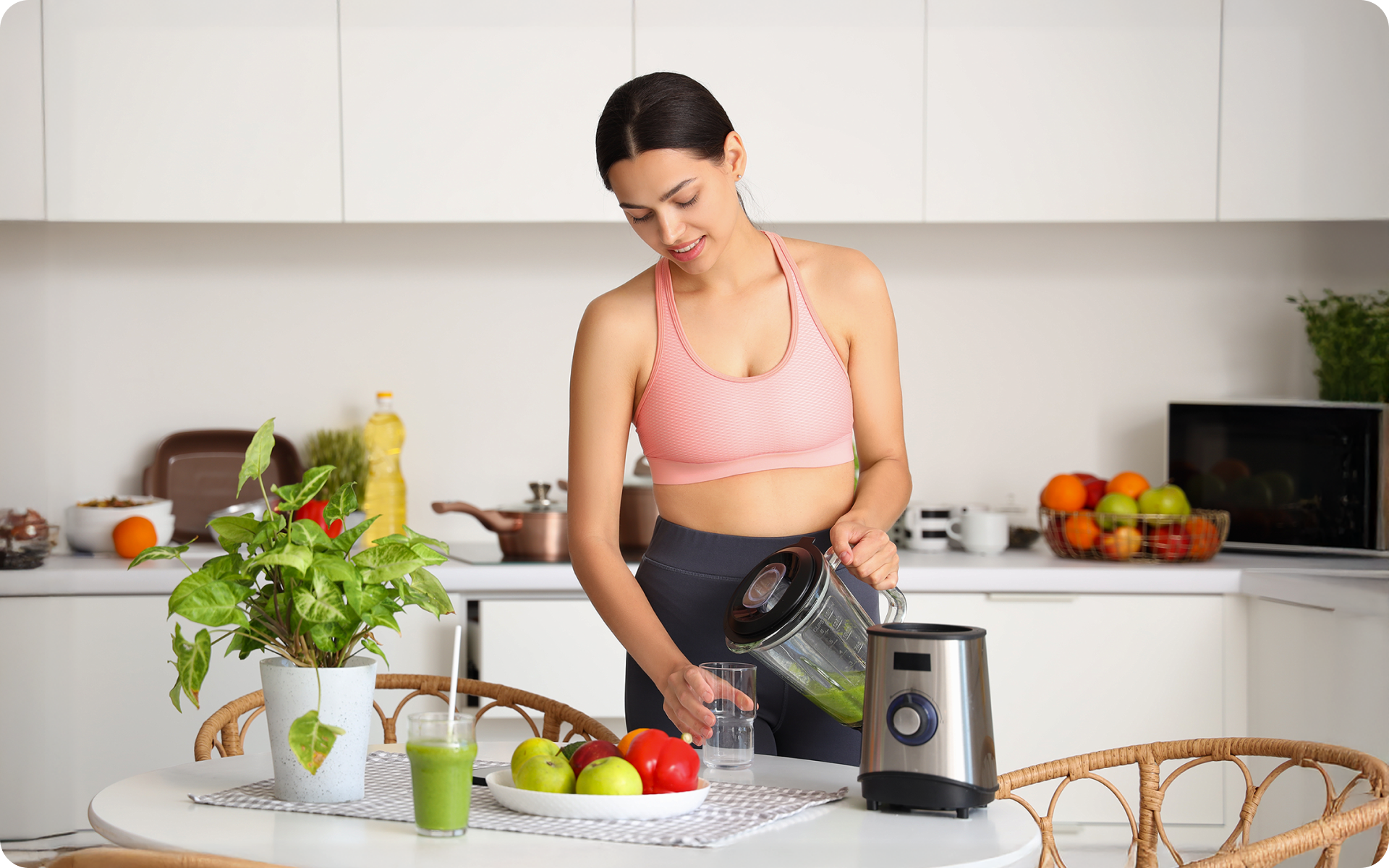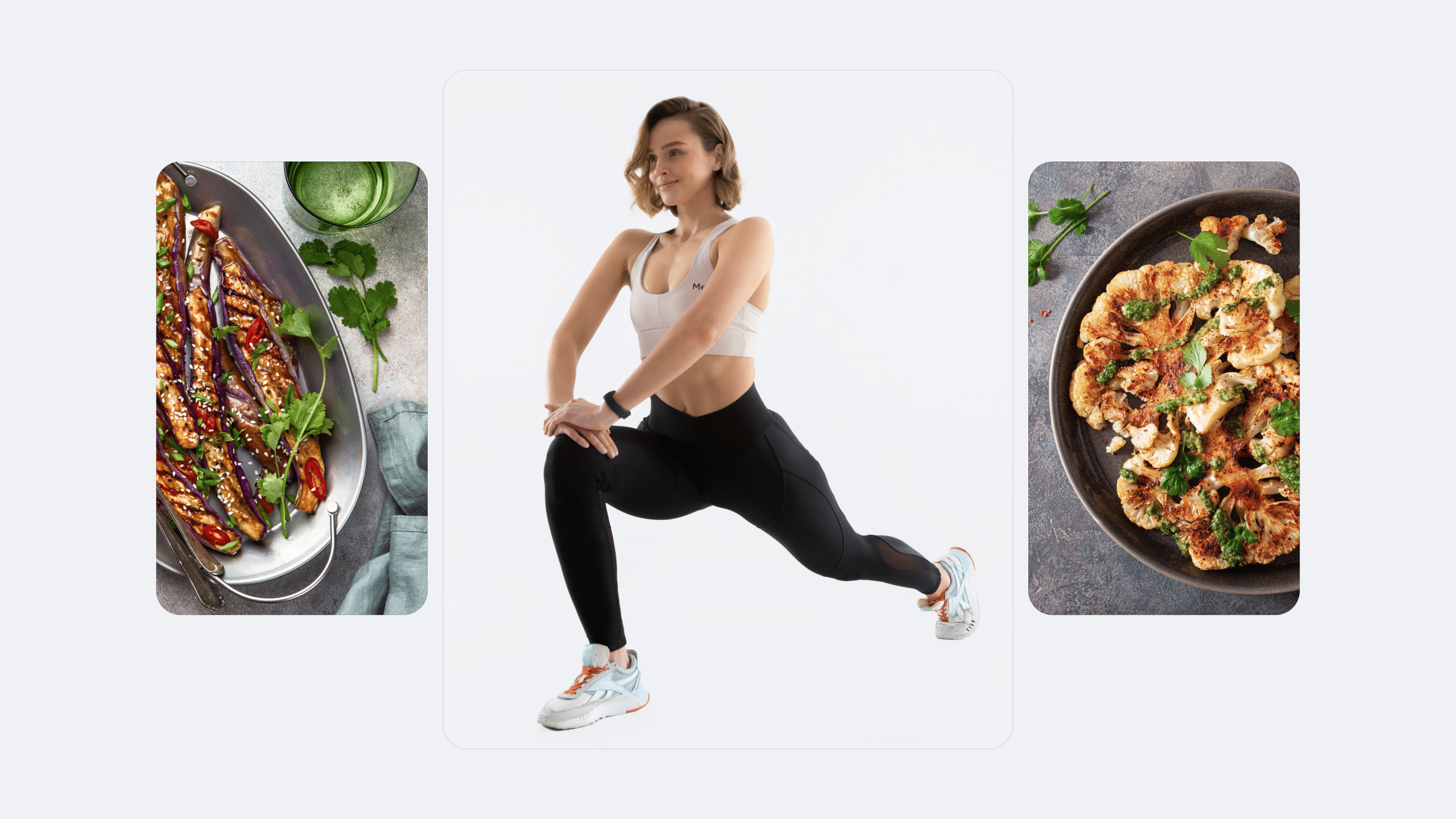For many people, weight loss can be frustrating. There are so many diets that promise great results and it’s difficult to figure out which one works. What makes it more confusing is that everyone’s body is different, so the weight loss results vary greatly. What works for one person may not work for another.
The liquid diet is one of the many diets that promise to help you lose 10 pounds in 2 weeks. Although it’s extremely restrictive, it seems to work for some. Also, you might have seen 14-day liquid diet weight loss results that make you want to try it. Here’s what you need to know before you go on a 14-day liquid diet.
What Are Liquid Diets?
Liquid diets are one of the most restrictive eating plans. They should not be followed for a long period and 14 days is long enough as any longer may risk dangerous complications (4).
A liquid diet involves consuming nothing but liquids, although some people allow themselves to consume 8 ounces of solid food daily.
The calories you need per day depend on your weight, height, age, gender, and lifestyle (16). If you want to start this kind of diet, you’ll probably find it hard to ensure you get enough nutrients.
A registered dietitian can help you make sure your body gets all the vitamins and minerals it needs to function properly while you go through the two weeks.
Liquid diets consist mainly of soups, smoothies, or shakes (1). In some cases, the liquid diet is prescribed by doctors as a pre- or post-operation eating plan, while some people do it only to shed weight (4).
If you struggle to even flirt with the idea of giving up your favorite foods or working out till your legs give way – BetterMe app is here to breathe a fresh perspective into the way you view the weight loss process! Check out the app and experience the fun side of fitness and dieting with BetterMe!
How Do Liquid Diets Work?
For weight loss, the basis of these diets is reducing your calorie intake. As a result, your body should start to burn the excess fat you’ve stored. However, what many people don’t realize about these diets is that if you don’t burn more calories than you consume, you won’t lose weight.
Unless you consume fewer calories than those you burn every day, the scale won’t move the way you want it to. This is true regardless of your preferred weight loss method (10).
The reason for this is simple – a liquid diet doesn’t always equal a low-calorie diet. For example, meal replacement shakes (particularly those you make at home) can contain a lot of calories, depending on the ingredients.
Consuming two or three of these per day is fine as you’ll end up consuming approximately 800-1200 calories if you’re not eating solid food. However, having too many shakes and going above your regular calorie intake can be detrimental to your weight loss efforts.
To get better results, it is sometimes recommended to go on an exercise program during and/or after the diet period. In this way, you can burn even more calories while supporting muscle development and lose fat from your body.
A lot of people tend to gain back their weight after they complete these diets as they don’t stick to following a healthy eating pattern (14).
Types of Liquid Diets
An all-liquid diet can come in many forms, depending on what you drink and the reason you’re on the diet.
Water Fasting
You can fast for one to three days by consuming water only or a combination of water and sometimes herbal teas without sugar (13). You may experience fatigue and nausea if you’re not used to fasting.
Water fasting weight loss is often temporary as it is most likely water weight from fluid shifts caused by fasting.
Alternate Day Fasting
Alternate day fasting is a more lenient approach that allows you to consume a small number of calories, which for some people are mostly liquid, on alternate days while having regular solid food on the other days (9). It’s a good plan if you want to keep up with your daily routine while experiencing fewer hunger pangs, which often affect those who stick to water fasting.
This type of diet is more flexible as on your fasting days, you can choose to have clear liquids only (broth, juices, teas, and water) or meal replacement shakes that have more nutrients and are more filling.
Meal Replacement Liquid Diet
The meal replacement liquid diet involves substituting some or all meals with protein shakes. Some people find this a simpler way to lose weight as it doesn’t require much thought or planning. However, it can get a bit boring.
The protein shakes in this diet can be store-bought or homemade. The protein in the drinks can help people lose weight by reducing appetite (2).
Clear Liquid Diet
The clear liquid diet is the most restrictive one. Unfortunately, it’s also the most popular among those who are desperate to lose weight as quickly as possible. It’s also sometimes done short-term for medical reasons. It involves drinking only clear liquids for some time (5).
On this diet, you’re not allowed to consume shakes and smoothies that contain protein and other nutrients. You’re required to drink only juices, tea, clear broths, and water, which provide very little energy or nutrition.
What Can I Eat on a 2-Week Liquid Diet?
You can’t eat anything, as that’s the entire point of this diet. You must stick to the liquid schedule you’ve set for yourself.
Here are some ideas for liquids you can consume during the two weeks (15):
- Strained soups (store-bought or homemade)
- Fresh juice
- Vegetable broth
- Clear chicken and beef broths
- Herbal teas
- Protein shakes (homemade or store-bought)
- Milk
- Yogurt-based drinks
Read more: 7-Day Weight Loss Low-Carb Diet: Choose High-Protein, High-Fiber, or Ultra-Low-Carb
Pros of Liquid Diets
Despite their restrictive nature, these diets may show initial results. Here are some of the pros of a liquid diet plan:
Weight Loss
An all-liquid diet can help you lose weight quickly if it is done right (3). It is sometimes used under the supervision of a doctor to prepare for bariatric surgery.
While you’re using such a diet to lower your calorie consumption, you should still consume enough to give you energy for daily activity and exercise.
You also need to make sure you get all the nutrients your body needs. It’s harder to do so on water fasts and liquid detoxes, but easier on the meal replacement liquid diet.
Cheap and Easy
There is no diet that’s cheaper than one that requires you to drink nothing but plain water, and most liquid diets are quite affordable and require less planning and cooking than other types of diets.
Quick Results
A liquid diet will provide quick results, but whether they’re healthy or not is another matter.
Is It Safe to Do a 14-Day Liquid Diet?
The cons of taking nothing but liquids for 14 days outweigh any benefits of this diet plan.
Temporary Weight Loss
You may experience weight gain after you stop this kind of diet plan.
Your body is in starvation mode, so it starts to conserve energy, meaning that when you resume your normal eating habits, even if you go back to healthy foods, it’s likely that you’ll regain some or all of the weight you lost (8). Your body has become accustomed to a calorie deficit and if you don’t continue with this, your weight may increase.
Whether you’re a workout beast or just a beginner making your first foray into the world of fitness and dieting – BetterMe has a lot to offer to both newbies and experts! Install the app and experience the versatility first-hand!
Lack the Necessary Protein for Building Muscle
Liquid diets are low in protein and can make you lose a lot of lean muscle mass as you lose weight. Although you’ll seem thinner after finishing the diet plan, chances are that some of the weight wasn’t fat and was lean body mass.
Without muscle, your body burns fewer calories, and you may eventually regain weight (12).
Hunger Pangs
It’s quite hard to ignore hunger pangs as liquids don’t fill you up as much as solid food does and it can be difficult to disregard the feeling of hunger. If you’re used to eating regularly throughout the day, then a liquid diet may lead to overeating once you resume your regular diet.
Eating Disorders
Restrictive diets can trigger eating disorders such as anorexia, bulimia, and binge eating disorder (BED) (7). Women who’ve been diagnosed with these conditions should never try going on any diet without first consulting their doctor.
Side Effects
If you’re going to do a water fast, you should be prepared for side effects such as headaches, fatigue, dizziness, bad breath, nausea, and constipation. Drinking more water only provides temporary relief from these symptoms, but your health is at risk if you decide to ignore them.
Dehydration
As previously mentioned, drinking only water for a few days can lead to dehydration. If you experience headaches, bad breath, and fatigue, these may be signs of dehydration.
About 20 to 30% of water is derived from foods you consume, as are most of your electrolytes (6). It’s not something you should ignore because when your body starts to lose too much water (more than 1% per day), you may develop more serious problems such as muscle cramps or even kidney failure.
Read more: 24 Weight Loss Smoothies, 2 Diet Plans, and 5 Belly Fat Smoothie Secrets
Increased Risk of Nutrient Deficiencies
If you decide to do a water fast or any other liquid diet, you should talk to your doctor or registered dietitian about supplements as most of the essential vitamins and minerals are not present in such diets (11).
Monotony
You may feel tired or bored if you drink only liquids for days on end. You need to stay motivated, which means switching from your usual breakfast option to something new every few days, experimenting with different beverages, or having shakes instead of full meals.
FAQs
Can I do a liquid diet for 2 months?
You should never follow an all-liquid diet for longer than 14 days as doing so can lead to serious health risks and nutrient deficiencies. A liquid diet that lasts any longer than a few days is generally not recommended unless prescribed by a doctor.
The risks of extending this diet are covered in more detail in our blog – 7-Day Liquid Diet.
Is yogurt good on a full liquid diet?
Yes, yogurt is a good option on a full liquid diet. It’s a good source of protein and can provide some variety in your meal plan. However, it’s important to choose plain or low-sugar options rather than flavored yogurts that may contain added sugars and calories.
There’s some controversy surrounding whether yogurt is actually a liquid, as it can contain solid pieces of fruit or bits of granola. However, it’s best to choose a thinner, more liquid-based yogurt without fruit or other additives.
Our Clear Liquid Diet guide clarifies which liquids are allowed and which you should avoid.
Why am I gaining weight on a liquid diet?
You’re gaining weight on a liquid diet because you’re consuming more calories than your body needs or you’re consuming too many high-sugar liquids.
A common misconception is that by cutting out solid foods, you’ll automatically reduce your calorie intake and lose weight, but this isn’t always the case.
The absence of fiber, which increases satiety and helps regulate blood sugar levels, can lead to overeating and weight gain.
Our Intermittent Fasting 101 guide includes more information on how to properly time your meals and snacks for maximum weight loss results.
The Bottom Line
If it is done properly and not for too long (14 days or less), liquid diets can help you lose weight. However, they’re quick-fix solutions for weight loss that cost more than they are worth.
A liquid diet is generally followed by weight regain when you start to eat solid food again. Furthermore, it can create severe nutrient deficiencies. To ensure there are no complications after completing one of these diets and make sure you can maintain your weight loss, you should consult your healthcare provider before embarking on such a diet plan.
DISCLAIMER:
This article is intended for general informational purposes only and does not serve to address individual circumstances. It is not a substitute for professional advice or help and should not be relied on for making any kind of decision-making. Any action taken as a direct or indirect result of the information in this article is entirely at your own risk and is your sole responsibility.
BetterMe, its content staff, and its medical advisors accept no responsibility for inaccuracies, errors, misstatements, inconsistencies, or omissions and specifically disclaim any liability, loss or risk, personal, professional or otherwise, which may be incurred as a consequence, directly or indirectly, of the use and/or application of any content.
You should always seek the advice of your physician or other qualified health provider with any questions you may have regarding a medical condition or your specific situation. Never disregard professional medical advice or delay seeking it because of BetterMe content. If you suspect or think you may have a medical emergency, call your doctor.
SOURCES:
- 6 best juice cleanses to try in 2024: From an immunity-boosting detox to a protein packed cleanse | HELLO! (2024, hellomagazine.com)
- A high-protein diet for reducing body fat: mechanisms and possible caveats (2014, ncbi.nlm.nih.gov)
- Calorie Restriction and Fasting Diets: What Do We Know? (2018, nia.nih.gov)
- Clear liquid diet (2020, mayoclinic.org)
- Clear Liquid Diet – StatPearls – NCBI Bookshelf (2021, ncbi.nlm.nih.gov)
- Contribution of Water from Food and Fluids to Total Water Intake: Analysis of a French and UK Population Surveys (2016, ncbi.nlm.nih.gov)
- Dieting and the Development of Eating Disorders in Overweight and Obese Adults (2020, jamanetwork.com)
- Do Liquid Diets Help You Lose Weight? (2020, webmd.com)
- Effect of Alternate-Day Fasting onWeight Loss, Weight Maintenance, and Cardioprotection Among Metabolically Healthy Obese Adults (2013, ncbi.nlm.nih.gov)
- Fat loss depends on energy deficit only, independently of the method for weight loss (2007, pubmed.ncbi.nlm.nih.gov)
- Full Liquid Diet – StatPearls – NCBI Bookshelf (2021, ncbi.nlm.nih.gov)
- Increasing muscle mass to improve metabolism (2013, ncbi.nlm.nih.gov)
- Is fasting safe? A chart review of adverse events during medically supervised, water-only fasting (2018, ncbi.nlm.nih.gov)
- Maintenance of lost weight and long-term management of obesity (2019, ncbi.nlm.nih.gov)
- The 14 Best Weight Loss Drinks You’ll Actually Enjoy Sipping All Day Long, According To Dietitians (2023, womenshealthmag.com)
- What should my daily intake of calories be? (2019, nhs.uk)










